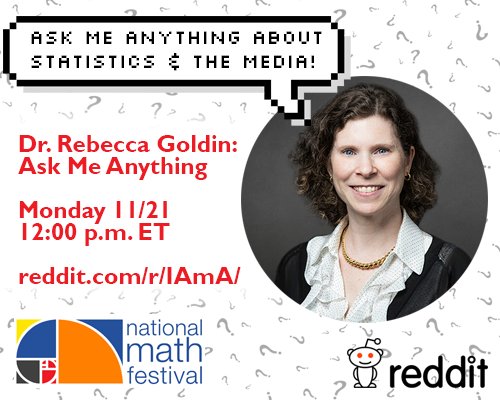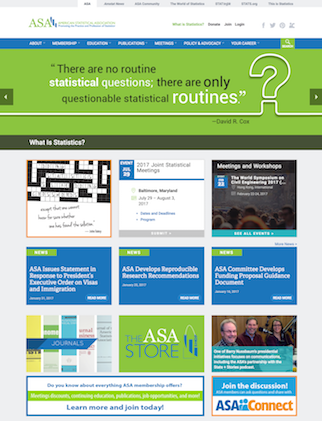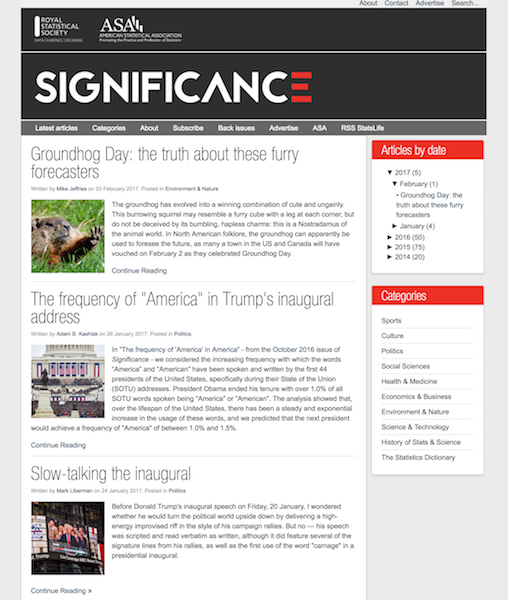
STATS is our collaborative project with the American Statistical Association to improve statistical literacy among journalists, academic journal editors, and researchers.
“The ASA-SAS USA partnership on STATS has set its sights squarely on the target of developing a statistical literate citizenry, and is quite likely the most important development in the American Statistical Association’s long efforts to promote statistical literacy.”

New on STATS
 STATScheck
STATScheck
Are you a journalist? Our volunteer advisory board of academics from across the U.S.
are here to help you make sense of statistics and numbers. We’ll do our best to help you make your deadline.
Business Insider
Dallas Morning News
Five Thirty Eight
Forbes
Fortune
Fusion
Gatehouse Media
Health News Review
Huffington Post
KOMOTV
L.A. Times
Las Vegas Review Journal
Medpage Today
National Geographic
National Press Foundation
National Public Radio
New York Times
News Tribune
NPR
PBS NewsHour
Press Democrat
ProPublica
Quartz
Reuters
STAT News
Vox
Wall Street Journal
Washington Post
Worcester Business Journal
WUSA9
 STATS Workshops
STATS Workshops
Free interactive workshops in statistics tailored to science, health, and general reporting. We’ll come to your newsroom, journalism school or media organization.
 Promoting Statistical Literacy
Promoting Statistical Literacy
Sense About Science USA promotes statistical literacy at academic and public events across the U.S.
 Scientifically Speaking (STATS edition)
Scientifically Speaking (STATS edition)
We also work with statisticians and statistics students to improve the public’s understanding of statistics through better communication.
 STATS Forum
STATS Forum
A venue for statisticians and mathematicians to critically evaluate study design and statistical methods in research. The subjects (products, procedures, treatments, etc.) of the studies being evaluated are neither endorsed nor rejected by Sense About Science USA. We encourage readers to use these articles as a starting point to discuss better study design and statistical analysis. While we strive for factual accuracy in these posts, they should be considered academic rather than journalistic writing.
The CDC Conspiracy
Should the media cover anti-vaccination claims? It seems as if conventional reporting would probably do more harm than good if it did by reporting both sides and creating the impression of equivalency between weight of evidence and false claims. But what if the latest claim is a statistical analysis—and a senior CDC vaccine researcher appears to back it up?
The CDC Conspiracy
Should the media cover anti-vaccination claims? It seems as if conventional reporting would probably do more harm than good if it did by reporting both sides and creating the impression of equivalency between weight of evidence and false claims. But what if the latest claim is a statistical analysis—and a senior CDC vaccine researcher appears to back it up?
African American Boys and Autism
A shocking reanalysis of CDC data claimed that African American boys had a greater risk of autism associated with the time they were vaccinated, and that the agency had covered up this finding. The study ignited a wave of conspiracy charges across the web; but...
David Spiegelhalter, Winton Professor for the Public Understanding of Risk at the University of Cambridge talks about what makes statisticians miserable and why it’s important for society.
Sense About Science Executive Director Trevor Butterworth talks about the importance of statistical literacy for journalists on Montreal’s The Body of Evidence.
Reddit AMA with STATS Director Rebecca Goldin. Click here.
 Partners and Resources
Partners and Resources
Our partners, major statistical organizations, books, articles, and blogs.






